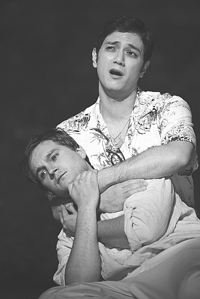New York City Opera’s “Acis” makes critic cry
Steven Blier’s New York Festival of Song filled Merkin Hall April 11 with the kind of fascinating nonpareil exploration of the song literature that makes this venture such a rewarding part of Manhattan’s musical life. The theme, “Godmothers of Song,” took in several centuries’ span of music generated by patronesses—not a few of them lesbian, as Blier pointed out.
Blier always presents interesting vocal artists. Carolyn Betty showed a radiant, substantial soprano in Gluck’s sublime “O malheureuse Iphigénie,” lovely Tchaikovsky duets with piquant contralto Sasha Cooke, and a brand new cycle by Paul Moravec, “Parables,” of which “The Rose and the Nightingale” in particular stood out. William Sharp showed again he is an almost unparalleled master at delivering American songs—to say nothing of French chansons—with natural scansion. Mezzo Alexandra Montano had the daunting task of singing the Roethke-set “Snake” (1963) with Ned Rorem present; she did well, making one wish for more Rorem songs on the program. Michael Barrett made a proficient alternate pianist.
The one mild reservation I have about Blier’s warm, personal commentary is his tendency to announce that his collaborators are “divine creatures;” they may be, but surely that is something an audience—even one as plainly adoring as his—should be allowed to decide for itself. The next NYFOS program, on May 16, recaps a popular evening of 1920s and 30s British songs for Broadway and American songs for the West End—Coward, Gershwin, Kern, Novello, Porter, Rodgers—50 percent gay composers. For this show Blier unites a terrific quartet of music theatre professionals including Mary Testa, Lisa Vroman, Hal Cazalet, and Jason Graae. Tickets at 212-501-3330.
The Philadelphia Orchestra concert April 19 under music director Christoph Eschenbach proved very satisfying, indicative of a general high standard. It’s not only the newish hall that makes Orchestra-going more exciting and a more inclusive experience—certainly in terms of age range of attendees, but I’d say racially as well—than going to the Philharmonic under Lorin Maazel. The presence of so many more young people in the Philly audience could suggest that going to the Orchestra gets passed along more in families in a city with far less urban mobility than New York has; but also, many students from Curtis Institute attend, as the school has always been a conduit for outstanding younger players into the orchestral big-time.
Beethoven’s Eighth, full of burgeoning melody, seemed apt for the coming of Spring, and got a luxuriously smooth reading. The baritone version of “Das Lied von der Erde,” while evoking terrific solo work from the oboe, cello, and clarinet players, probably coalesced more on subsequent nights; Eschenbach certainly didn’t shy away from the score’s thornier aspects. Paul Groves, always musical and to my ears never much more than earnest interpretively, was somewhat swamped in the onslaught, except in ‘Von der Jugend,” more lightly scored. Groves got through the panic-inducing tessitura with dignity, but it’s not a piece which exhibits the best part of his tenor—his piano singing.
One has to hand it to Thomas Hampson, now more than two decades into world stardom, for the high level of vocalism he achieved at his best moments in his three songs—sometimes he indulged in a bit of crooning—and for his complete stylistic mastery in Mahler. Yet the hints of musical “high priesthood” in his presentation, while not quite so distracting as the grimaces of a Wolfgang Holzmair, kept me from being moved by his “Das Abschied,” beautifully voiced as much of it was. Fine artistry seems finer when it doesn’t proclaim itself.
The next day yielded City Opera’s “Acis and Galatea,” a Mark Lamos staging that I found rather cloying at Glimmerglass but that—despite the theater being all too obviously too large for such an intimate work—pleased and even moved on this occasion. Lamos has re-weighted and improved the show; its inclusivity of same-sex pairings among the Arcadian couplings remains a welcome touch. NYCO didn’t offer voices of the caliber of the upstate festival’s William Burden and Christine Brandes in the leads, but Philippe Castagner and Sarah Jane McMahon were at least fluent and pleasing vocally—she sometimes better than that, though it’s a kind of Broadwayish voice for Handel—and she’s obviously a trained dancer, very expressive onstage. The whole well-staged progression of chorus, recit and the sublime “Heart, the seat of soft delight”—perhaps the most moving aria in English after Dido’s Lament—got my tears going in way they’re rarely engaged in the opera house these days.
Nicholas Phan stood out for his exceptional diction, the words really wedded to his pliant tenor with musical aplomb. He made the most of Lamos’ brilliant conception of Damon’s final aria, “Consider fond shepherd,” that it is a confession of love to Acis, who understands but cannot reciprocate. This got the tears going, too—who hasn’t been there, at some point?
Jason Hardy showed a good, rumbustious but agile bass as Acis’ murderous—and mountainous—rival, but Lamos’ concept has him do all kinds of funny dance steps, blunting any possible sense of menace from what is, after all, the agent of mortality in the piece. Ransom Wilson rushed the Overture but then calmed down and led satisfyingly. On to “Semele” and the revived “Flavio” next year.
David Shengold (shengold@yahoo.com) writes about opera for many venues.
gaycitynews.com


































